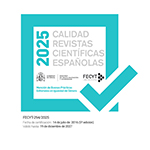Ideología y estética de la novela corta: una lectura social de Die Judenbuche, de Annette von Droste-Hülshoff
Abstract
The attempts to consider the works of Annette von Droste-Hülshoff from a social point of view have mostly emphasised, in a unilateral way, the influences of the class and the geographical milieu. Consequently, the interpretations have overlooked a utopical dimension that is always present in her works, and that is rendered through a complex symbolism and a number of elements proceeding from the pagan and Christian traditions — though translated into the language of Romanticism. An inquiry on the relationship of Droste with the romantic anticapitalist tradition (and, especially, with the so-called «Heidelberg Romanticism») allows to understand more accurately the social meaning of her works and, notably, of Die Judenbuche.Downloads
Article download
License
In order to support the global exchange of knowledge, the journal Revista de Filología Alemana is allowing unrestricted access to its content as from its publication in this electronic edition, and as such it is an open-access journal. The originals published in this journal are the property of the Complutense University of Madrid and any reproduction thereof in full or in part must cite the source. All content is distributed under a Creative Commons Attribution 4.0 use and distribution licence (CC BY 4.0). This circumstance must be expressly stated in these terms where necessary. You can view the summary and the complete legal text of the licence.










